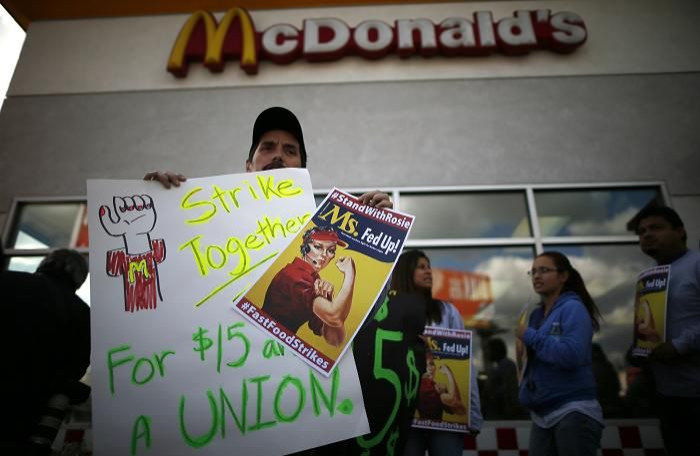As Cities Push To Raise Minimum Wages, Business Interests Push Back With Preemptive Legislation

As the U.S. Senate floor was clearing out for lunch on Wednesday after voting not to advance a bill that would have raised the national minimum wage, New York City council members began a debate that could set a new wage for workers in the five boroughs.
New York is not alone in pushing local laws amid inaction on the federal level. Currently, Albuquerque and Santa Fe, New Mexico, San Francisco, San Jose, California, and the District of Columbia have their own minimum wages that are higher than state or federal standards.
“We think it’s an important strategy as a way to combat poverty locally,” said Paul Sonn, legal co-director for the nonprofit National Employment Law Project, which is based in New York City and supports increasing wages for low-income hourly workers.
On Sunday, Santa Fe County implemented a minimum-wage hike from $7.50 per hour to $10.66, to match Santa Fe city’s decade-old local, higher wage standard. In October, the counties bordering the District of Columbia will increase their floors as well, suggesting that once a city passes a wage hike, adjoining municipalities tend to follow suit.
New York’s resolution would require state legislation freeing the city to abandon the state’s current $8 hourly wage floor and opening the way to force Big Apple businesses to pay a higher wage.
New York City joins Seattle, Portland, Maine, and Las Cruces, New Mexico, in considering higher hourly wage floors. NELP estimates that 120 cities in the country have enacted rules requiring higher wages for businesses that receive public contracts.
These localized efforts have pushed business interests to lobby against the wage hikes, arguing that having different standards inside states creates havoc for companies.
This battle played out last month in Oklahoma, where Gov. Mary Fallin signed a law banning minimum wage hikes at the municipal level. The bill was declared an “emergency” in order to preempt local labor activists who were already campaigning for an Oklahoma City vote on the issue.
“That’s why they treated it like an emergency. They knew we were collecting signatures,” Tim O’Connor, president of the Central Oklahoma Labor Federation, a local AFL-CIO union affiliate, said. His group is looking into whether it can challenge the law on constitutional grounds.
“There are literally dozens of cities inside Oklahoma City, or immediately adjacent to it,” Roy Williams, president and CEO of the Greater Oklahoma City Chamber, said. “If each one had a different minimum wage it would create a nightmare for businesses, especially ones with multiple businesses in different locations. What we believe is there ought to be the same kind of wage applicability across the state.”
Mississippi and Florida have also joined the list of a dozen states that have passed these local preemption bills, according to the National Conference of State Legislatures.
In Washington, Republican state Sen. John Braun introduced a bill that, like the Oklahoma law, would prohibit cities and municipalities from passing their own wage rules. Sonn from NELP says the bill has little chance of passing. Seattle Mayor Ed Murray is pushing to raise the city's minimum wage to as much as $15 per hour. Nearby SeaTac -- a city of about 28,000 residents whose primary source of business is the international airport serving Tacoma and Seattle -- implemented a controversial minimum wage law on Jan. 1 that applies only to hotels with more than 100 rooms and the local park-and-fly operations serving travelers in and out of the airport.
In a close 54-42 vote Wednesday, the Senate blocked a vote on a bill that would have increased the federal minimum wage from $7.25 to $10.10 per hour in increments over the next 30 months. The move shifts the focus of the national wage-floor debate back to the states.
© Copyright IBTimes 2025. All rights reserved.





















